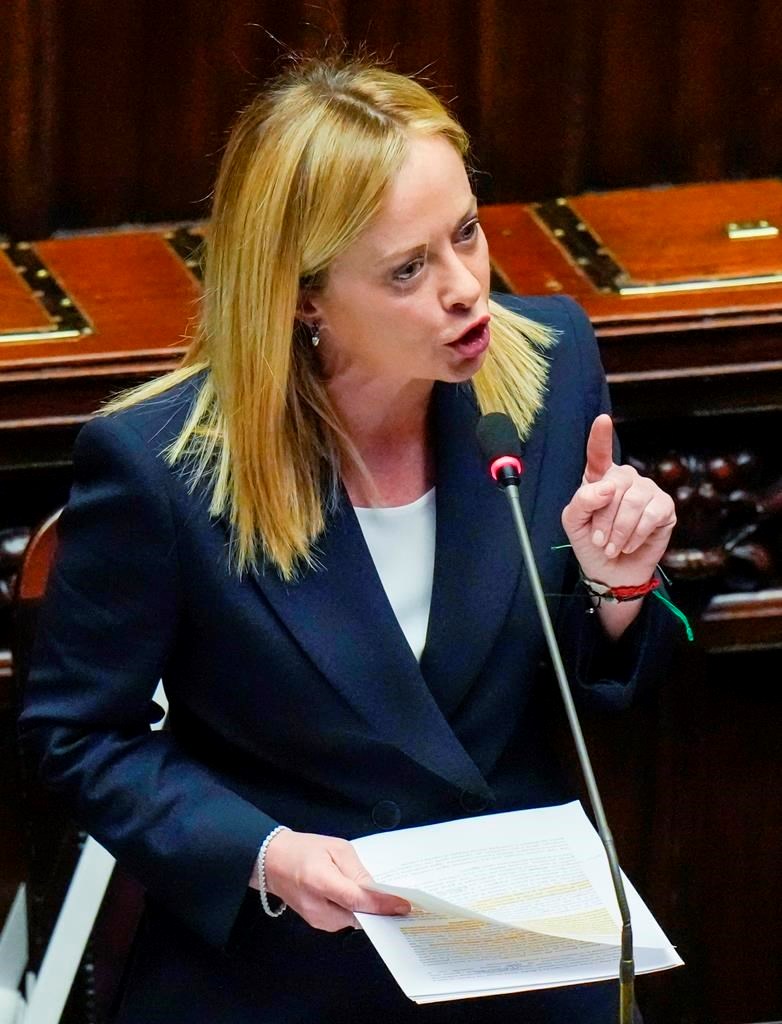ROME (AP) — Italy’s new far-right-led government of Premier Giorgia Meloni on Tuesday night easily won the first of two required confidence votes in Parliament by a comfortable margin.
The vote in the lower Chamber of Deputies was 235 in favor of her coalition government and 154 against, while there were five abstentions. The coalition needed at least 195 votes for a majority.
On Wednesday, the new government will face a vote in the upper chamber, the Senate, where it also holds a solid majority. The confidence votes are required by the Constitution for new governments.
Earlier Tuesday in the Chamber, Meloni laid out her government’s policy aims, firing back at domestic and foreign critics who are worried that her far-right politics might undermine European unity or the civil rights of Italian citizens.
She criticized the European Union for not always being ready for challenges, notably the dramatic energy crisis now threatening households and businesses.
But she pledged that her 4-day-old coalition government, which includes right-wing and center-right allies, would stay loyal to EU accords, while working for reforms, including on monetary rules.
“To pose these questions doesn’t mean being an enemy or a heretic but a practical” person, Meloni said in a 70-minute speech.
She bristled at critics, including those from foreign governments, who have said they would keep a “vigilant” eye on Italy's first far-right-led government since the end of World War II.
Such attitudes are tantamount to "a lack of respect for the Italian people, who don't need lessons,'' Meloni said.
The premier's 10-year-old Brothers of Italy party was the top vote-getter in Italy's parliamentary election last month, winning 26% of the ballots cast.
She governs together with her main allies, anti-migrant League leader Matteo Salvini and conservative former Premier Silvio Berlusconi.
With the confidence votes out of the way, Meloni will be able to get down to the business of governing.
Meloni, 45, voiced awe at becoming the first woman to govern Italy and acknowledged the weight of that responsibility “toward all those women who face heavy and unjust” burdens in balancing family and work.
She expressed determination to “break the heavy glass ceiling that's on our heads.”
Meloni recited the first names of women in Italy with great achievements, including a Communist politician who was the first woman to be elected president of the Chamber of Deputies, an astronaut and a Nobel-prize-winning scientist.
Meloni spoke with U.S. President Joe Biden, who offered her his congratulations and underscored the strong relationship between the United States and Italy. They discussed their commitment to continue providing assistance to Ukraine and holding Russia accountable for its aggression, according to a readout of their call.
In the debate that followed the premier's speech, an opposition leader, Democratic Party chamber whip Debora Serracchiani, challenged Meloni to fight “inequality and poverty, which needs immediate interventions and not ideological propaganda with which your government was born and is taking its first steps.”
The premier confirmed her campaign pledge to back Ukraine in its defense against Russia's invasion. Berlusconi and Salvini have long admired Russian President Vladimir Putin and expressed skepticism about the effectiveness of stiff Western sanctions against Moscow.
Meloni also sought to allay detractors’ fears that her government would undo Italy’s abortion rights law, saying it “will never limit citizens’ freedom.”
To boost Italy's birthrate, one of the world's lowest, cities and towns should operate free day-care centers and nursery schools that stay open during business and store hours, she said.
“We need a massive plan, economic but also cultural, to rediscover the beauty of parenthood and put the family back at the center of society," Meloni said. She has denounced what she calls “LGBT ideology.”
Meloni has been dogged by critics who say she hasn't unambiguously condemned fascism. Brothers of Italy, which she co-founded in 2012, has roots in a far-right party founded by nostalgists for 20th century dictator Benito Mussolini.
“I have never felt sympathy or closeness for any non-democratic regime, including fascism,” Meloni told lawmakers in the Chamber of Deputies. She decried Mussolini's 1938 racist laws, which persecuted Italy's small Jewish community as "the lowest point of Italian history.”
Hundreds of migrants whom charity-operated ships rescued from smugglers' distressed boats in the central Mediterranean in recent days are awaiting permission from authorities to get off in Italian ports.
Meloni made no mention of them but reiterated a campaign pledge to revive military patrols of the Mediterranean for a naval blockade to thwart smugglers based in northern Africa, particularly Libya.
When Salvini was interior minister in 2018-2019 during a populist-led coalition, he at times kept rescue boats waiting for weeks before they were assigned ports for disembarking passengers.
At one point, Meloni apologized during the debate to an opposition lawmaker, Aboubakar Soumahoro, an Italian-Ivorian union leader who has fought for migrant rights.
The premier addressed him with the informal form of “you,” which in Italian language usage is considered a lack of respect. After the ranks of the opposition protested, she apologized, saying “anyone can make a mistake.”
Meloni promised to make it easier for renewable energy projects, just as wind farms, to win authorities' approval.
“The motto of this government will be, 'Don't disturb those who want to do something,''' Meloni said. She said Italy needs ”less bureaucracy, fewer rules," a recipe she said would help fight corruption.
EU rules say Italy's overall debt, which now stands at 150% of gross domestic product, must move toward 60%. But Meloni insisted that “the path to reducing debt isn't the austerity of the past” but structured, economic growth.
___
Raf Casert in Brussels and Giada Zampano in Rome contributed reporting.
Frances D'emilio, The Associated Press




